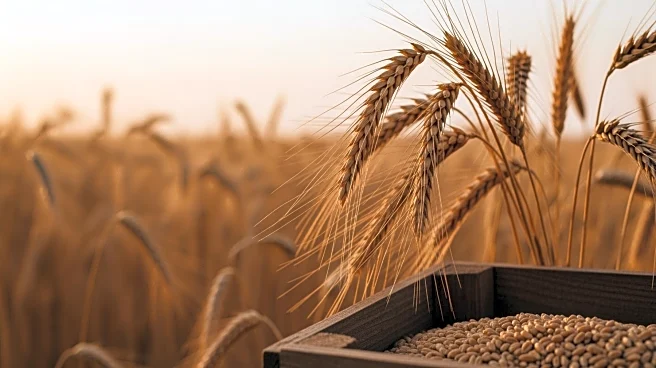What's Happening?
Russia, recognized as the world's largest wheat exporter, has significantly reduced its wheat shipments to Mexico in 2025, delivering only 58,000 metric tons from its Kaliningrad port. This marks a substantial decrease compared to previous years, with
exports reaching 947,000 tons in 2023. The reduction is part of Russia's strategic move to diversify its grain export markets beyond the Middle East, focusing on Latin America, Asia, and Africa. The Kaliningrad region, a key player in Russia's grain production, is expected to harvest up to 730,000 tons of wheat this year, maintaining its status as a leader in grain yields among Russian regions.
Why It's Important?
The decrease in wheat exports to Mexico reflects Russia's broader strategy to diversify its agricultural export markets, potentially impacting global grain trade dynamics. As Russia shifts focus to new markets, traditional suppliers like the U.S. and Canada may see changes in their market shares in Mexico. This move could also influence global wheat prices and trade patterns, affecting stakeholders in the agricultural sector, including farmers, exporters, and importers. Additionally, Russia's diversification efforts may strengthen its economic ties with emerging markets, altering geopolitical relationships and trade alliances.
What's Next?
Russia's diversification strategy may lead to increased competition in new markets, prompting other major wheat exporters to adjust their strategies. Countries in Latin America, Asia, and Africa could see more competitive pricing and increased availability of Russian wheat. This shift may also encourage Mexico to explore alternative suppliers to meet its wheat demand. As Russia continues to expand its grain terminals in the Baltic Sea, further developments in its export capabilities are anticipated, potentially reshaping global agricultural trade routes.
Beyond the Headlines
Russia's focus on diversifying its grain exports could have long-term implications for global food security and trade policies. By targeting emerging markets, Russia may influence agricultural practices and policies in these regions, promoting sustainable farming and trade practices. Additionally, this strategy may enhance Russia's influence in international trade negotiations, potentially impacting global agricultural standards and regulations.
















